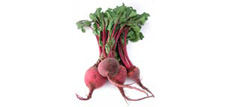Beetroot Nutrition

A Few Facts Regarding Nutrition In Beetroot
A look into nutrition in beetroot reveals how this vegetable benefits us in a number of ways in terms of health and nutrition. Often referred to as simply a beet, the beetroot is one vegetable in which both the leaves and the tuberous root can be eaten, and both are packed with nutrition. The beet family is a rather large one, with vegetables such as spinach and Swiss chard being near relatives. A closer relative is the sugar beet, often grown as a source of sugar where sugar cane is not available. Types of beets are also grown for animal fodder. Lovers of spinach, particularly cooked spinach, often find cooked beet leaves to be a nice alternative, just as good tasting and just as nutritious. The root of the beet is usually eaten sliced or cubed and cooked, but is often pickled and later served cold.
Lots Of Carbohydrates, Fiber, and Vitamins - Nutrition in beetroot tables reveal that this vegetable is rich in carbohydrates and fiber. There is even a greater percentage of carbohydrates in canned beetroots, no doubt due to what is included in the canning syrup, so those who are busy counting carbohydrates may seem more comfortable sticking with raw or home cooked beets which contain only about 1/4 of the carbohydrates found in those coming from cans. Beetroots are super rich in Vitamin B, with a serving providing well over half the recommended daily allowance. The beetroot is also a good source of potassium (8% of the recommended daily allowance) and a source of Vitamin C and Magnesium (both at 4%), copper and zinc (both at 3%). Also on the positive side in terms of the nutrition in beetroot is the short list of what the vegetable does not contain, or contains in minuscule amounts. Beetroots are very low in saturated fats, sodium, and cholesterol.
Benefits From Nutrition In Beetroot - You will come across various claims regarding the health benefits of beetroots. Many of these are true, while others stretch the truth a bit. One such claim is that the beetroot, especially beetroot juice, is an excellent way to bring down blood pressure. This statement is true in the sense that it has been shown that beetroot juice does lower blood pressure. What often goes unsaid is that you have to drink an awful lot of it each day, about a quart, to realize the effects. Beetroots do contain a significant amount of folates which do in fact play a role in reducing blood pressure.
Beetroots are beneficial to the heart, at least to the extent that they are a good source of soluble fiber, a know cholesterol reducer. Carotenoids contained in beetroots are generally believed to help keep bad cholesterol levels down, as are flavonoids, also found in this vegetable. Even though beetroot's Glycemic Index is in the medium range for vegetables, eating an excessive amount of beetroots will not bring on weight gain, as the vegetable's Glycemic Load is a low number, meaning that the conversion of the carbohydrates into sugar is a slow process, and blood sugar levels are relatively unaffected.
Other Claims A Little Shaky - Other claims for the beetroot include it as a cancer fighter because it is a source of betaine, and that the juice is effective in the battle against hardened arteries. As is the case with claims of reducing blood pressure, there is an element of truth here, but just how effective and how much of the vegetable or its juice you need to consume remains undefined, or at least unclear. Beetroot nutritional elements include chemicals or compounds that supposedly are good for liver, gall bladder and kidney problems. Beetroot does have a cleansing capability that has been proven. The same can be said for other vegetables as well, the point being that beetroots are good for you, very good in fact. But the secret to preventing many disorders and curing others lies more in eating a variety of healthy foods, like vegetables, fruits, and whole grain. Including beetroots in the mix certainly adds to what would already be a healthy and nutritious diet.